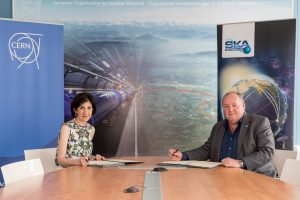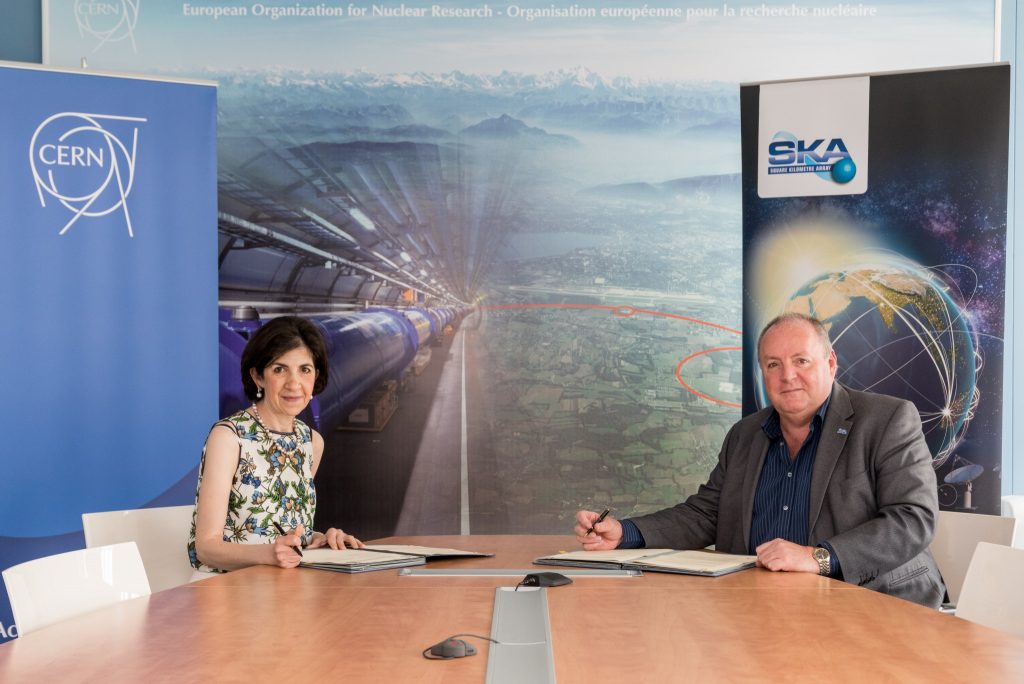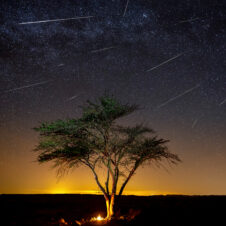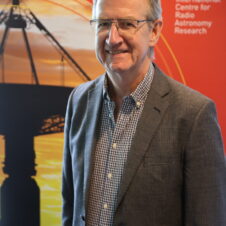CERN Headquarters, Geneva, Thursday 13 July 2017
SKA Organisation and CERN, the European Laboratory for Particle Physics, today signed an agreement formalising their growing collaboration in the area of extreme-scale computing.

L>R: Fabiola Gianotti and Prof. Philip Diamond Director General, SKA Organisation (Square Kilometre Array telescope)
The agreement establishes a framework for collaborative projects that addresses joint challenges in approaching Exascale computing (1 Exabyte = 1 billion Gigabytes) and data storage.
Around the world, countries are engaged in efforts to cope with a leap in the demands of Information and Communication Technology. The Square Kilometre Array (SKA) project, the world’s largest radio telescope when built, and CERN’s Large Hadron Collider (LHC), the world’s largest particle accelerator, famous for discovering the Higgs Boson, will contribute in driving the required technological developments.
“The signature of this collaboration agreement between two of the largest producers of science data on the planet shows that we are really entering a new era of science worldwide”, said Prof. Philip Diamond, SKA Director-General.
“Both CERN and SKA are and will be pushing the limits of what is possible technologically, and by working together and with industry, we are ensuring that we are ready to make the most of this upcoming data and computing surge.”
“The LHC computing demands are tackled by the Worldwide LHC computing grid which employs more than half a million computing cores around the globe interconnected by a powerful network. As our demands increase with the planned intensity upgrade of the LHC we want to expand this concept by using common ideas and infrastructure, into a scientific cloud. SKA will be an ideal partner in this endeavour.” said Prof. Eckhard Elsen, CERN Director of Research and Computing.
CERN and SKA have identified the acquisition, storage, management, distribution, and analysis of scientific data as particularly burning topics to meet the technological challenges.
In the case of the SKA, it is expected that phase 1 of the project – representing approximately 10% of the whole SKA – will generate around 300 PB (petabytes) of data products every year. This is ten times more than today’s biggest science experiments.
CERN has just surpassed the 200 PB limit for raw data collected by the experiments at the LHC over the past seven years. A layered (tiered) system provides for data storage in the remote centres. The High-Luminosity LHC is estimated to exceed this level every year.
“This in itself will be a challenge for both CERN and SKA given the step change in the amounts of data we will have to handle in the next 5-10 years”, explains Miles Deegan, High-Performance Computing Specialist for the SKA. “Transferring an average dataset will take days on the SKA’s ultra-fast fibre optic networks, which are 300 times faster than your average broadband connection, so storing or even downloading this data at home or even at your local university is clearly impractical.”
As is already the case at CERN, SKA data will also be analysed by scientific collaborations distributed across the planet. There will be common computational and storage resource needs by both institutions and their respective researchers, with a shared challenge of taking this volume of data and turning them into science that can be published, understood, explained, reproduced, preserved and presented.
“Processing such volumes of complex data to extract useful science is an exciting challenge that we face”, adds Antonio Chrysostomou, Head of Science Operations Planning for the SKA. “Our aim is to provide that processing capability through an alliance of regional centres located across the world in SKA member countries. Using cloud-based solutions, our scientific community will have access to the equivalent of today’s 35 biggest supercomputers to do the intensive processing needed to extract scientific results. In short, we need to fundamentally change how science is done.”
“CERN has proposed the concept of the Federated Open Science Cloud with other EIROForum members. This agreement is an important step in this direction.” said Ian Bird, responsible at CERN for the World-wide LHC Computing Grid. “Essentially, we will provide a giant cloud-based, Dropbox-like, facility to science users around the world, where they will be able to not only access incredibly large files, but will also be able to do extremely intensive processing on those files to extract the science.”
As part of the agreement, CERN and SKA will hold regular meetings to monitor progress and discuss the strategic direction of their collaboration. They will organise collaborative workshops on specific technical areas of mutual interest and propose demonstrator projects or prototypes to investigate concepts for managing and analysing Exascale data sets in a globally distributed environment. The agreement also includes the exchange of experts in the field of Big Data as well as joint publications.

L>R: Fabiola Gianotti and Prof. Philip Diamond Director General, SKA Organisation (Square Kilometre Array telescope)
Media Enquiries to:
William Garnier
Director of Communications, Outreach and Education SKA Organisation
M: +44 7814 908 932
E: W.Garnier@skatelescope.org
Arnaud Marsollier
Head of Press CERN
E: Arnaud.Marsollier@cern.ch
About the SKA
The Square Kilometre Array (SKA) project is an international effort to build the world’s largest radio telescope, led by the SKA Organisation based at the Jodrell Bank Observatory near Manchester. The SKA will conduct transformational science to improve our understanding of the Universe and the laws of fundamental physics, monitoring the sky in unprecedented detail and mapping it hundreds of times faster than any current facility. The SKA is not a single telescope, but a collection of telescopes or instruments, called an array, to be spread over long distances. The SKA is to be constructed in two phases: Phase 1 (called SKA1) in South Africa and Australia; Phase 2 (called SKA2) expanding into other African countries, with the component in Australia also being expanded. Already supported by 10 member countries – Australia, Canada, China, India, Italy, New Zealand, South Africa, Sweden, The Netherlands and the United Kingdom – the SKA Organisation has brought together some of the world’s finest scientists, engineers and policy makers and more than 100 companies and research institutions across 20 countries in the design and development of the telescope. Construction of the SKA is set to start in 2019, with early science observations in the early 2020s. Learn more about the SKA: http://skatelescope.org/
About CERN
CERN, the European Organization for Nuclear Research, is one of the world’s leading laboratories for particle physics. The Organization is located on the French-Swiss border, with its headquarters in Geneva. Its Member States are: Austria, Belgium, Bulgaria, Czech Republic, Denmark, Finland, France, Germany, Greece, Hungary, Israel, Italy, Netherlands, Norway, Poland, Portugal, Romania, Slovakia, Spain, Sweden, Switzerland and United Kingdom. Cyprus, Serbia and Slovenia are Associate Member States in the pre-stage to Membership. India, Pakistan, Turkey and Ukraine are Associate Member States. The European Union, Japan, JINR, the Russian Federation, UNESCO and the United States of America currently have Observer status. Lear more about CERN: http://home.cern

